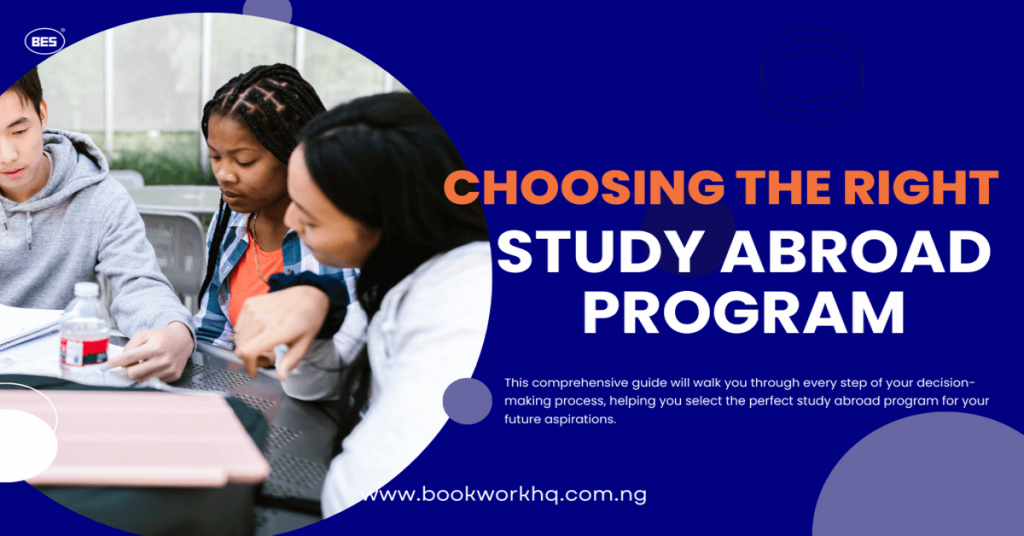
Studying abroad is an exciting and life-changing experience that can broaden your horizons, enhance your education, and provide you with invaluable personal growth. It’s an opportunity to immerse yourself in a new culture, meet people from around the world, and gain a global perspective on your field of study. However, choosing the right study abroad destination is a crucial decision that can greatly impact your overall experience. To help you make an informed choice, we’ve compiled a comprehensive guide outlining the steps to select the perfect study abroad destination for you.
1. Define Your Goals and Objectives
Before embarking on your study abroad journey, it’s essential to clarify your goals and what you hope to achieve. Consider the following questions:
- What are your academic and career goals?
- Do you want to learn a new language or improve your language skills?
- Are you interested in a specific culture or region?
- Do you have any personal or cultural preferences?
Understanding your objectives will guide you in selecting a destination that aligns with your aspirations.
2. Research Your Field of Study
Different destinations offer various strengths in different academic fields. Research universities and programs renowned for your chosen major or area of study. Evaluate the faculty, research opportunities, and resources available. If you’re pursuing a specialized field, make sure the destination has the necessary facilities and expertise.
3. Consider Language Requirements
Language can be a significant factor in your choice of destination. If you’re fluent in a particular language or eager to learn one, this can narrow down your options. Alternatively, you might prefer to study in an English-speaking country if you’re more comfortable with the language. Be mindful of language proficiency requirements for admission.
4. Financial Planning
Studying abroad can be costly, so it’s vital to budget accordingly. Research tuition fees, living costs, and available scholarships or financial aid options. Consider the overall cost of living in the destination, as well as any exchange rates that may affect your budget.
5. Safety and Security
Safety should be a top priority when choosing a study abroad destination. Research the safety record of your potential destinations, and consult government travel advisories. Pay attention to factors such as political stability, crime rates, and healthcare quality.
6. Cultural Fit
Consider your cultural preferences and comfort level. Are you drawn to a particular culture or region? Do you prefer a bustling city or a more laid-back environment? Think about your lifestyle, interests, and whether you’d like to explore a culture similar to or vastly different from your own.
7. Climate and Location
Climate can significantly impact your study abroad experience. Some people thrive in tropical climates, while others prefer temperate or colder regions. Think about your climate preferences and how they might affect your daily life and activities.
8. Visa Requirements and Regulations
Visa regulations vary from country to country. Investigate the visa application process for your chosen destination and ensure you meet all the requirements. Be aware of any work restrictions for international students, as this could impact your ability to support yourself while abroad.
9. Support Services
Look into the support services offered by the host institution. Does the university have a dedicated international student office? Are there orientation programs and academic advisors to assist with your transition? These services can make a significant difference in your overall experience.
10. Connect with Alumni and Current Students
Reach out to alumni and current students who have studied in your potential destination. They can provide valuable insights into the academic environment, culture, and day-to-day life. Social media and networking platforms can be excellent tools for connecting with these individuals.
11. Evaluate Cultural and Extracurricular Opportunities
Consider what the destination has to offer outside of academics. Explore opportunities for cultural immersion, travel, and extracurricular activities. Look for clubs, organizations, or events that align with your interests and hobbies.
12. Review Accessibility
Think about how accessible your destination is for travel within the region and back home. Consider proximity to airports, transportation options, and ease of obtaining flights.
13. Seek Advice from Academic Advisors
Consult with your academic advisors or study abroad office at your home institution. They can provide guidance, recommend programs, and assist with the application process.
14. Create a Shortlist
Based on your research and considerations, create a shortlist of potential study abroad destinations that align with your goals and preferences.
15. Apply and Prepare
Once you’ve made your decision, complete the application process, and prepare for your study abroad adventure. This includes securing housing, arranging finances, and obtaining the necessary travel documents.
Choosing the right study abroad destination is a significant decision that requires careful consideration. By following these steps and conducting thorough research, you can select a destination that not only enhances your academic and career prospects but also provides a fulfilling and enriching experience. Remember that studying abroad is an opportunity to grow, learn, and explore the world, so embrace it with an open mind and a spirit of adventure. Your journey awaits!
Bookworm Educational Services is here to help you every step of the way. Our study abroad consulting and placement services can ensure you have a seamless and enriching experience. Contact us today to get started on your international education adventure!



Pingback: Exploring Your Study Abroad Options: Types of Visas · Bookworm Educational
Pingback: Elementor #2521 · Bookworm Educational
Pingback: TIPS FOR PREPARING FOR STANDARDIZED STUDY ABROAD EXAMS · Bookworm Educational